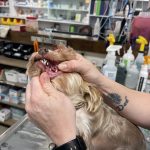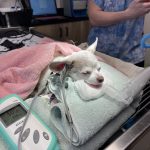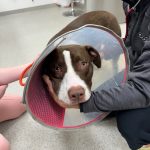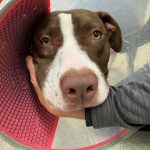Hello
I’m sorry to hear about your friends cat. I’m also not sure what advice I can give as I don’t. Know what kind of injury or diagnosis this is.
I do however think it is important to be honest about your financial abilities and express that to the surgeon. It is perfectly acceptable to ask for affordable treatment options and insist that they be provided.
We’ve had my dog for 6+ years. Up until about 3 months ago, he never got in the garbage and only stole food off a counter one time that we’ve known of. However, this is not the case now. For the last three months, he has started regularly getting into the garbage and recycling bags. He stole a loaf of bread off the counter the other day. The only thing we can think of that has changed is that we started giving our cat wet food instead of dry. But it seems weird that this would be the thing to trigger the behavior. Any ideas? And what can we do to train him out of it? He only does this when we are out of the house.
Comments
My cats are patients of Jarrettsville Vet. I am reaching out please to get information for my friend. They are located in Michigan and Her 7 year old indoor cat hurt its back leg. Her vet told her that she needed to see an orthopedic specialist because the cat tore a ligament. They made an appointment and were told it would run $250 for the visit plus whatever they needed to do to identify the problem and surgery could cost up to $8000. They are a young couple with a small daughter, and are looking for other options. I thought I had seen a video that Dr. magnifico did regarding anti-inflammatories, pain meds, and cage rest. Can you please Point us in the right direction as to what she should do. I recommended that she contact her vet to see if those options were available to her through them and she could try that route first before seeing a surgeon. I am so blessed and grateful that Jarrettsville Vet is close to me and offers options such as those. Any and all advice would be greatly appreciated! Her appointment at the surgeon is tomorrow.
Comments
My almost 2 year old dog has started to nose his way out the door when I leave the house. This has only been going on for about a week. There are two people who live in the house with him. This problem started when I was leaving for a weekend. His other person was here for the whole time I was gone I have been gone for weekends before. I need help to try to stop this behavior so we don’t have to keep him locked in part of the house so we can get out or in the house.
Please help
Comments
I noticed this bump on my dogs (will be 5 years old in June, spayed female German Shepherd, up to date on vaccines, given simparica trio last week) ear tonight. I don’t think it has been there long seeing as it’s visible and I rub her ears often when she’s laying next to me. I did put pressure on it while trying to get pictures and there appears to be a tiny hole in which a small amount of fluid, light blood and some matter came out of. She went to daycare last week seeing as we are going out of town for a week and will need to board her while we’re away so I’m not sure if she was injured during play.
Comments
My pup was fine all day the. Out of the blue started yelping when he had to jump or tried to run or be active I can’t touch it’s back his legs his hips everything and he is fine can not pick him up with out him yelping screaming he can not jump up or down with out yelping
Comments
Good evening. Before reaching out and scheduling an appointment with vet in the morning. I will ask here.
We have a 9 year old Sharpei-Hound mix named Emma, that has had a significant change in personality with-in the last 3-4 days. Overall her “Normal” behavior is what you would imagine with a blood hound; laid back and basically lazy. But when she’s outside her Sharpei side shows; playful but a little more on the aggressive side.
We have a fenced in property, and ability to closely monitor her and our other dog; a 12 year Chocolate Lab. With that said, 1 week ago February 25th we were going through our bedtime routine. Both dogs went out. Our Lab came back in rather quickly, but Emma stayed out a little longer before making her way back to the door.
When she came inside, she was shaking very much and appeared traumatized. My wife and I attempted multiple times to check her over and give her some love. But very unlike herself she did not want any part of it. She had No signs of cuts or abrasions or any type of trauma. But the only thing was when we touched the top of her head more over her left side she would yelp and whimper.
The next day she was back to her normal self. Only with in the last 3-4 days we are noticing some rather concerning things with her. That has never been previously observed.
1.Today she has developed a lump about the size of an acorn on the top of her head and still cries out when touched.
2. Appetite has not diminished, but she has had an increase in amount of water drinking.
3. She seems to be having trouble hearing.
4. Significant “Spotting” the last 3 days. This has never occurred before. And yes she is spayed.
5. Tonight when letting the dogs out after supper, I found Emma sleeping on her bed but with her eyes wide open and shallow breathing. I initially thought she had passed away suddenly, but after jolting her she awoke and came to in this rather “dazed and confused” state.
6. I would say that she is a slightly lethargic, she still wanted to go out and play but was more stand off-ish when around other dog and kids.
As stated we found no signs of being bitten by another animal, and until within the last day or so she has been her normal self. She has no underlying health problems, and is very active for being 9 years old.
We will be setting up an appointment, but in the meantime looking for help or assistance of others who have experienced this with their dog.














First: get a full “senior” bloodwork panel done. Rule out anything medical.
Second: hide all trash and all food. Counter and garbage surfing are self-reinforcing. Lock the trash away, get a locking can. Remove all food from all counters and put them in a secure cabinet. Lock the fridge with a child lock, if necessary.
Third: Crate when you can’t supervise.
This is usually medical if it’s sudden like this, but you need to be proactive in your prevention, and it’s always a multiprong approach.
Thank you!